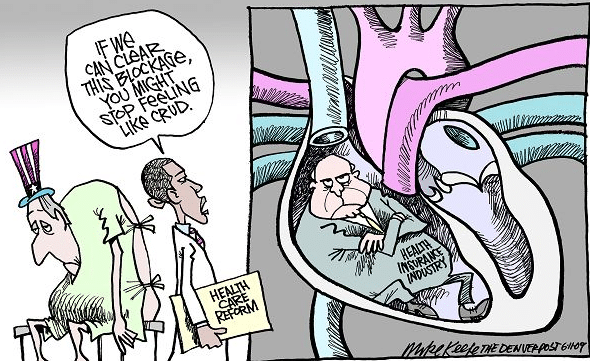Massachusetts has the highest or near-highest health insurance premiums of any state in the nation and it's the only state that mandates the purchase of health insurance by every resident. Yet the health insurance industry, in hunting for ways to sell the mandate to Americans who hate the idea, has concocted a ruse that a lot of people are actually buying.
 The industry's chief lobbying group, America's Health Insurance Plans (AHIP), is claiming that its surveys of members–i.e. health insurance companies– show a drop in annual premiums for single individuals in Massachusetts from $8,537 in 2006, when the state adopted an individual mandate, to $5,143 in 2009. That's 40% off–pretty spectacular! The AHIP claim is being repeated in news stories and blogs, particularly by authors who favor the health insurance mandate, and don't want to look too hard at such statistical manna from heaven.
The industry's chief lobbying group, America's Health Insurance Plans (AHIP), is claiming that its surveys of members–i.e. health insurance companies– show a drop in annual premiums for single individuals in Massachusetts from $8,537 in 2006, when the state adopted an individual mandate, to $5,143 in 2009. That's 40% off–pretty spectacular! The AHIP claim is being repeated in news stories and blogs, particularly by authors who favor the health insurance mandate, and don't want to look too hard at such statistical manna from heaven.
However, people who work in the Massachusetts health insurance market told me they don't believe these numbers. Federal and state data on Massachusetts also dispute the data AHIP is pushing. Massachusetts never saw a price drop of that size in any market, and any price cut in the individual market was because of a merger with the small business market, and because insurers started selling stripped-down policies in 2007. Price changes had little to no relation to the purchase mandate.
You can see the 2006 and 2009 AHIP surveys for yourself here and here. No one else–not the even the state of Massachusetts–regularly makes public state-level year-to-year data on private health insurance sales of individual and family policies It's all a trade secret. So much for transparency and consumer empowerment.
The few available other sources show dramatically different numbers.
A report by the National Conference of State Legislators in 2007, citing individual survey data from the Joint Economic Committee of the U.S. Congress, stated that Massachusetts’ average premium in the individual market in 2006 was $4,841 a year, barely over half of the purported AHIP number. See the study data here (in final table).
A recent report by the federal Agency for Health Research and Quality on Massachusetts’ employment-based group insurance market gives these historical premiums for single coverage in the employer-based health insurance market:
2004: 4,141
2006: 4,448
2009: 5,268
While the group and individual markets are not identical in pricing, they roughly follow one another.
Massachusetts also began its reforms with a lower rate of uninsured people than any other state, and its increase in nongroup private insurance purchases since the 2006 mandate amounts to only 12% of the newly insured. (Data from Milbank Quarterly.)
A 2010 report on health costs in Massachusetts shows that AHIP is mixing apples and oranges. The individual market and the small-group market in Massachusetts merged in 2006, and the inclusion of small businesses pulled down prices in the individual market by a couple of percentage points (though prices for small businesses went up by nearly the same amount). Insurers were also allowed to offer cheaper, stripped-down plans in the merged market. From the state report:
“The lowest-cost small group premium fell markedly in July 2007, when carriers introduced new low-cost products in the newly merged market (see Appendix, Figure C.2). These new products may have been introduced as Bronze coverage products made available to individuals through the Health Connector’s Commonwealth Choice program (as many
of the carriers in the study participate in Commonwealth Choice) or for other strategic reasons. … Overall, individual premiums declined significantly in 2008 [from $5,364 per year to $4,752) due to the shift in membership toward lower-premium products in the merged market. However, premiums for individuals in pre-merger products continued to increase.”
Even if the policies being bought were equal, which they were not, the one-time 13% decrease described in the state report is a far cry from the 40% drop being trumpeted by AHIP. And the drop was only for new policies–those who were already insured continued to see premiums increase.
AHIP should be ashamed of itself for touting its surveys as real data, though lobbyists are not well-acquainted with the concept of shame. What surprises me, though, is how easily AHIP has gotten people to believe its numbers. Then again, maybe not so surprising: Bernie Madoff didn't get rich off of skeptics.







